Analysis: A Proposal for Change in German Government Fiscal Policy
VerifiedAdded on 2022/09/01
|8
|1393
|19
Report
AI Summary
This report offers a detailed proposal for changes in German government fiscal policy, examining the nation's economic landscape and potential policy adjustments. The study begins by highlighting Germany's recent economic performance, including strong growth, low unemployment, and the influence of external factors like the European Central Bank's policies. It identifies the problem of a slowing GDP growth rate and the backlog in rail infrastructure investment. The proposal reviews Germany's existing fiscal frameworks, such as the "Debt Brake" and the "Black-Zero" budget, and questions the effectiveness of these measures in the face of economic challenges and the need for increased investment. It outlines the research questions focusing on the role of fiscal policy, global wealth tax and the potential for cutting government spending. The methodology includes adherence to research ethics and acknowledges the limitations of the study. The expected outcome is a comprehensive assessment of German fiscal policy and recommendations for expansion. The report concludes with a bibliography of relevant literature.
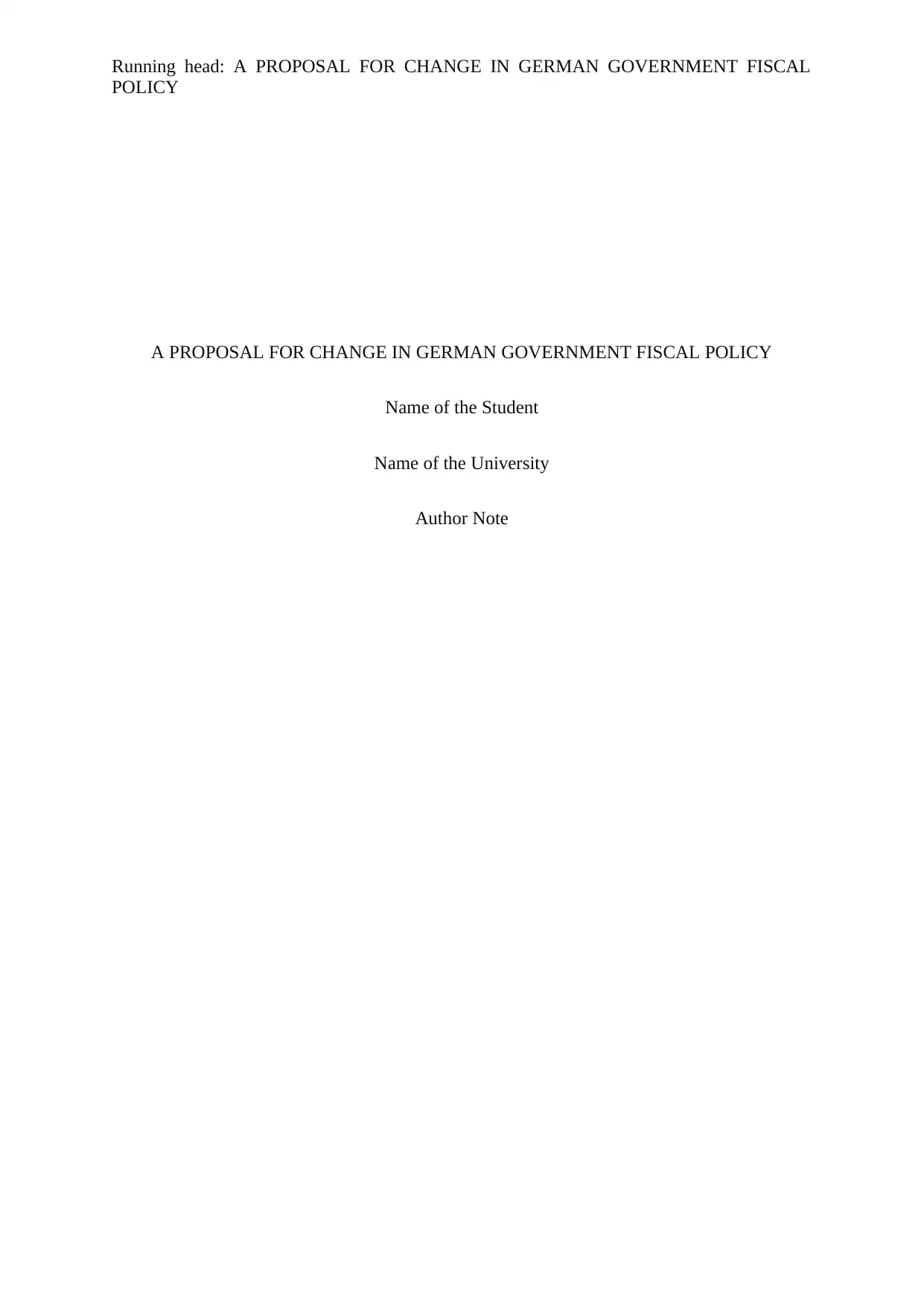
Running head: A PROPOSAL FOR CHANGE IN GERMAN GOVERNMENT FISCAL
POLICY
A PROPOSAL FOR CHANGE IN GERMAN GOVERNMENT FISCAL POLICY
Name of the Student
Name of the University
Author Note
POLICY
A PROPOSAL FOR CHANGE IN GERMAN GOVERNMENT FISCAL POLICY
Name of the Student
Name of the University
Author Note
Paraphrase This Document
Need a fresh take? Get an instant paraphrase of this document with our AI Paraphraser
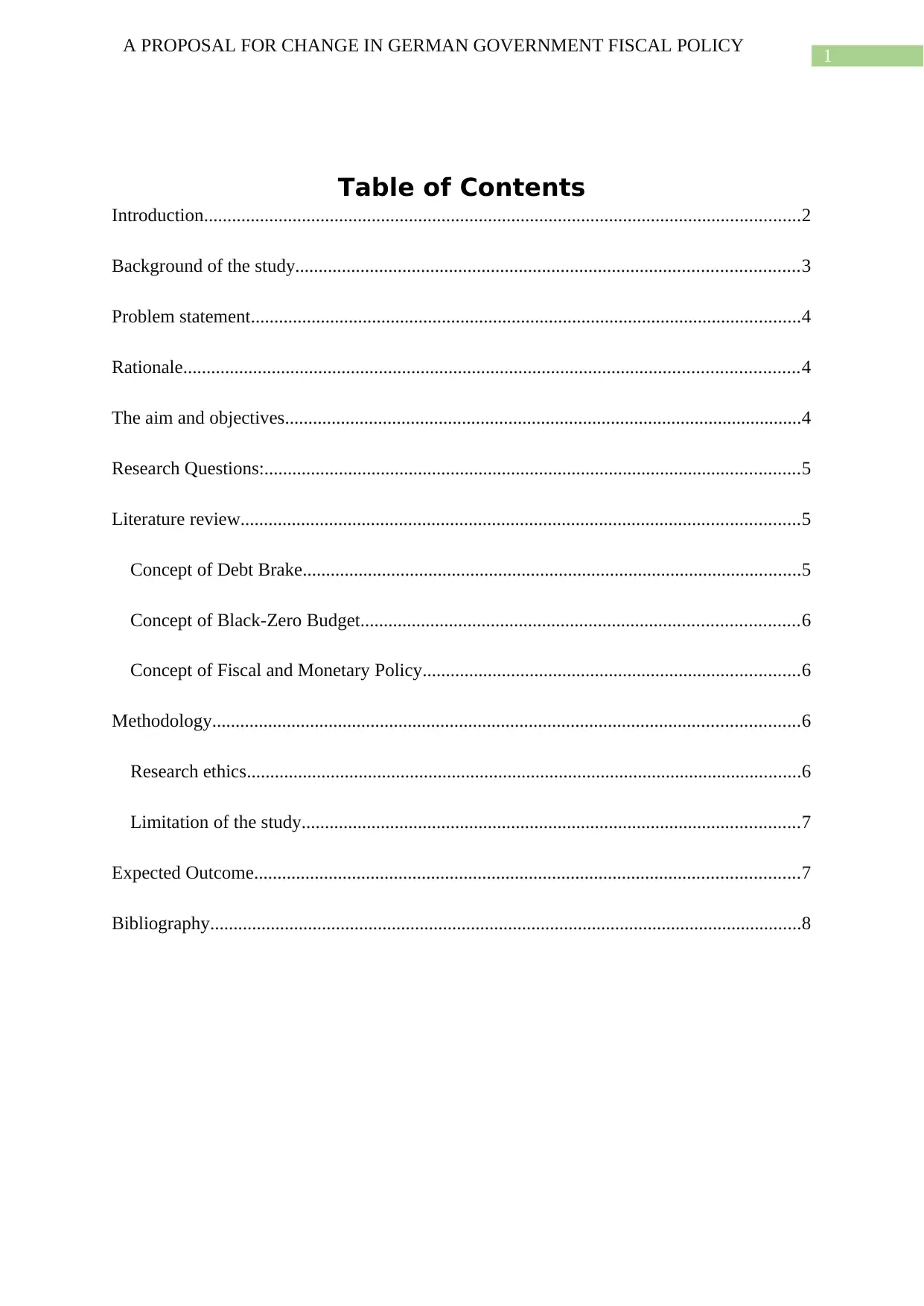
1
A PROPOSAL FOR CHANGE IN GERMAN GOVERNMENT FISCAL POLICY
Table of Contents
Introduction................................................................................................................................2
Background of the study............................................................................................................3
Problem statement......................................................................................................................4
Rationale....................................................................................................................................4
The aim and objectives...............................................................................................................4
Research Questions:...................................................................................................................5
Literature review........................................................................................................................5
Concept of Debt Brake...........................................................................................................5
Concept of Black-Zero Budget..............................................................................................6
Concept of Fiscal and Monetary Policy.................................................................................6
Methodology..............................................................................................................................6
Research ethics.......................................................................................................................6
Limitation of the study...........................................................................................................7
Expected Outcome.....................................................................................................................7
Bibliography...............................................................................................................................8
A PROPOSAL FOR CHANGE IN GERMAN GOVERNMENT FISCAL POLICY
Table of Contents
Introduction................................................................................................................................2
Background of the study............................................................................................................3
Problem statement......................................................................................................................4
Rationale....................................................................................................................................4
The aim and objectives...............................................................................................................4
Research Questions:...................................................................................................................5
Literature review........................................................................................................................5
Concept of Debt Brake...........................................................................................................5
Concept of Black-Zero Budget..............................................................................................6
Concept of Fiscal and Monetary Policy.................................................................................6
Methodology..............................................................................................................................6
Research ethics.......................................................................................................................6
Limitation of the study...........................................................................................................7
Expected Outcome.....................................................................................................................7
Bibliography...............................................................................................................................8
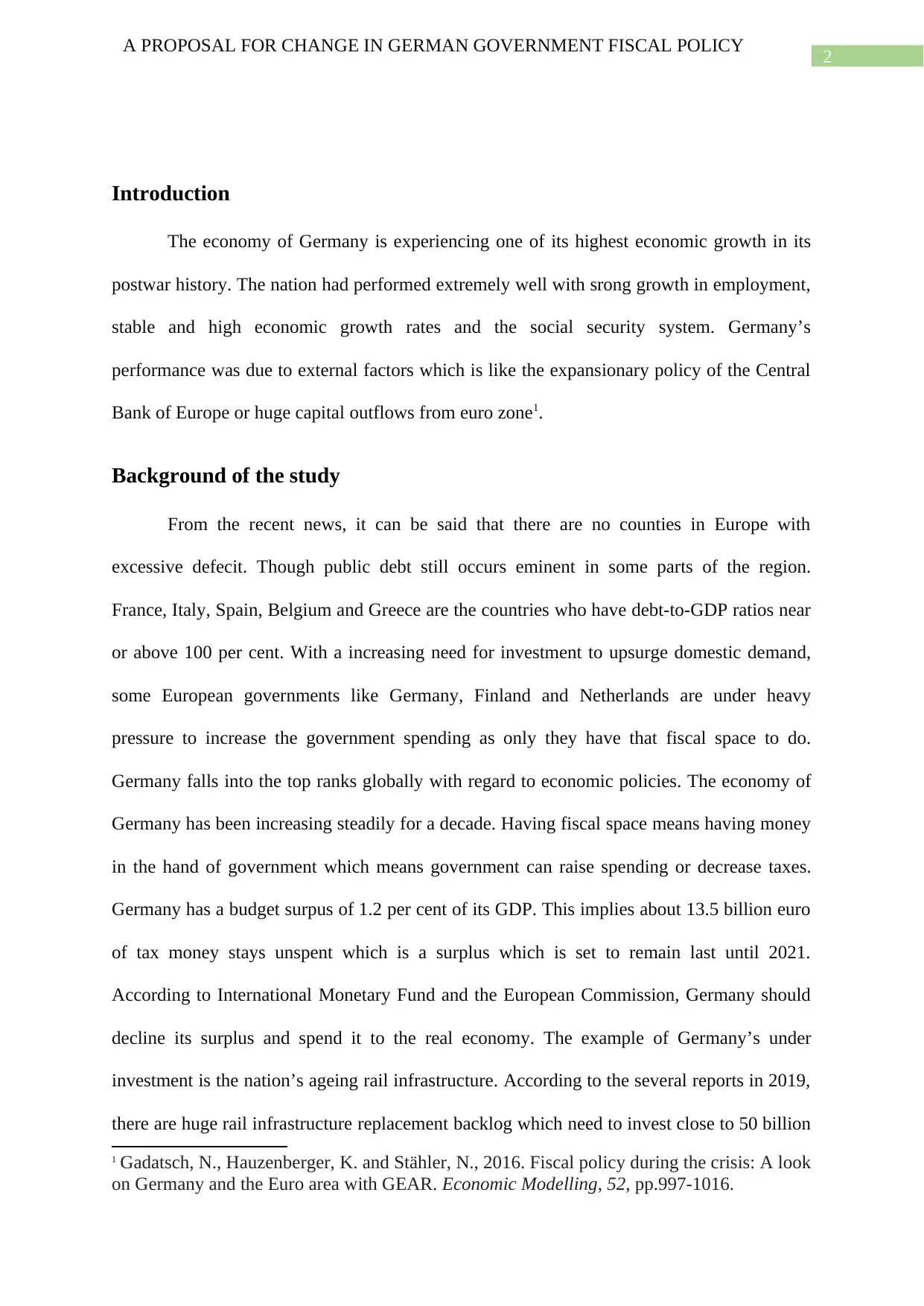
2
A PROPOSAL FOR CHANGE IN GERMAN GOVERNMENT FISCAL POLICY
Introduction
The economy of Germany is experiencing one of its highest economic growth in its
postwar history. The nation had performed extremely well with srong growth in employment,
stable and high economic growth rates and the social security system. Germany’s
performance was due to external factors which is like the expansionary policy of the Central
Bank of Europe or huge capital outflows from euro zone1.
Background of the study
From the recent news, it can be said that there are no counties in Europe with
excessive defecit. Though public debt still occurs eminent in some parts of the region.
France, Italy, Spain, Belgium and Greece are the countries who have debt-to-GDP ratios near
or above 100 per cent. With a increasing need for investment to upsurge domestic demand,
some European governments like Germany, Finland and Netherlands are under heavy
pressure to increase the government spending as only they have that fiscal space to do.
Germany falls into the top ranks globally with regard to economic policies. The economy of
Germany has been increasing steadily for a decade. Having fiscal space means having money
in the hand of government which means government can raise spending or decrease taxes.
Germany has a budget surpus of 1.2 per cent of its GDP. This implies about 13.5 billion euro
of tax money stays unspent which is a surplus which is set to remain last until 2021.
According to International Monetary Fund and the European Commission, Germany should
decline its surplus and spend it to the real economy. The example of Germany’s under
investment is the nation’s ageing rail infrastructure. According to the several reports in 2019,
there are huge rail infrastructure replacement backlog which need to invest close to 50 billion
1 Gadatsch, N., Hauzenberger, K. and Stähler, N., 2016. Fiscal policy during the crisis: A look
on Germany and the Euro area with GEAR. Economic Modelling, 52, pp.997-1016.
A PROPOSAL FOR CHANGE IN GERMAN GOVERNMENT FISCAL POLICY
Introduction
The economy of Germany is experiencing one of its highest economic growth in its
postwar history. The nation had performed extremely well with srong growth in employment,
stable and high economic growth rates and the social security system. Germany’s
performance was due to external factors which is like the expansionary policy of the Central
Bank of Europe or huge capital outflows from euro zone1.
Background of the study
From the recent news, it can be said that there are no counties in Europe with
excessive defecit. Though public debt still occurs eminent in some parts of the region.
France, Italy, Spain, Belgium and Greece are the countries who have debt-to-GDP ratios near
or above 100 per cent. With a increasing need for investment to upsurge domestic demand,
some European governments like Germany, Finland and Netherlands are under heavy
pressure to increase the government spending as only they have that fiscal space to do.
Germany falls into the top ranks globally with regard to economic policies. The economy of
Germany has been increasing steadily for a decade. Having fiscal space means having money
in the hand of government which means government can raise spending or decrease taxes.
Germany has a budget surpus of 1.2 per cent of its GDP. This implies about 13.5 billion euro
of tax money stays unspent which is a surplus which is set to remain last until 2021.
According to International Monetary Fund and the European Commission, Germany should
decline its surplus and spend it to the real economy. The example of Germany’s under
investment is the nation’s ageing rail infrastructure. According to the several reports in 2019,
there are huge rail infrastructure replacement backlog which need to invest close to 50 billion
1 Gadatsch, N., Hauzenberger, K. and Stähler, N., 2016. Fiscal policy during the crisis: A look
on Germany and the Euro area with GEAR. Economic Modelling, 52, pp.997-1016.
⊘ This is a preview!⊘
Do you want full access?
Subscribe today to unlock all pages.

Trusted by 1+ million students worldwide
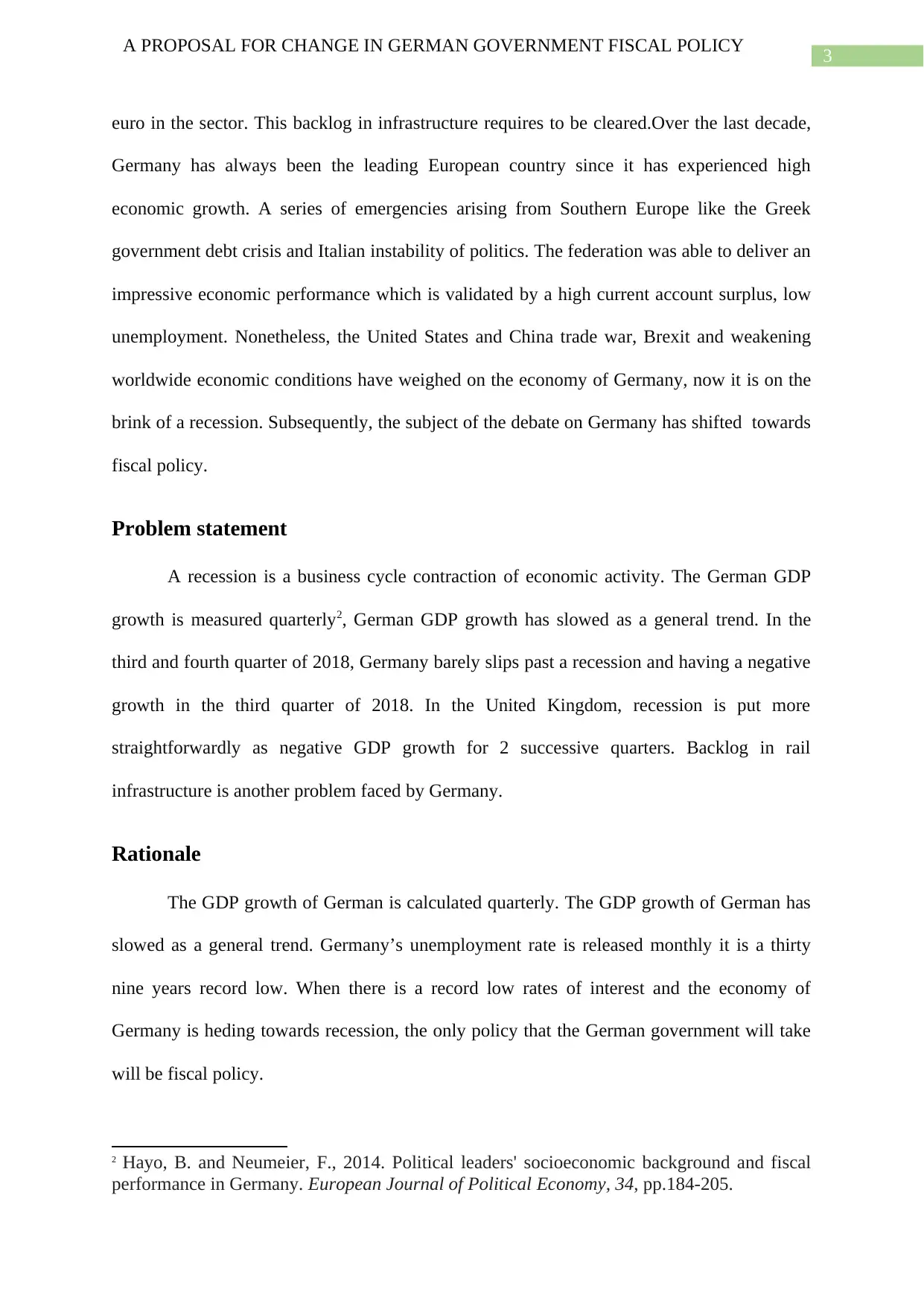
3
A PROPOSAL FOR CHANGE IN GERMAN GOVERNMENT FISCAL POLICY
euro in the sector. This backlog in infrastructure requires to be cleared.Over the last decade,
Germany has always been the leading European country since it has experienced high
economic growth. A series of emergencies arising from Southern Europe like the Greek
government debt crisis and Italian instability of politics. The federation was able to deliver an
impressive economic performance which is validated by a high current account surplus, low
unemployment. Nonetheless, the United States and China trade war, Brexit and weakening
worldwide economic conditions have weighed on the economy of Germany, now it is on the
brink of a recession. Subsequently, the subject of the debate on Germany has shifted towards
fiscal policy.
Problem statement
A recession is a business cycle contraction of economic activity. The German GDP
growth is measured quarterly2, German GDP growth has slowed as a general trend. In the
third and fourth quarter of 2018, Germany barely slips past a recession and having a negative
growth in the third quarter of 2018. In the United Kingdom, recession is put more
straightforwardly as negative GDP growth for 2 successive quarters. Backlog in rail
infrastructure is another problem faced by Germany.
Rationale
The GDP growth of German is calculated quarterly. The GDP growth of German has
slowed as a general trend. Germany’s unemployment rate is released monthly it is a thirty
nine years record low. When there is a record low rates of interest and the economy of
Germany is heding towards recession, the only policy that the German government will take
will be fiscal policy.
2 Hayo, B. and Neumeier, F., 2014. Political leaders' socioeconomic background and fiscal
performance in Germany. European Journal of Political Economy, 34, pp.184-205.
A PROPOSAL FOR CHANGE IN GERMAN GOVERNMENT FISCAL POLICY
euro in the sector. This backlog in infrastructure requires to be cleared.Over the last decade,
Germany has always been the leading European country since it has experienced high
economic growth. A series of emergencies arising from Southern Europe like the Greek
government debt crisis and Italian instability of politics. The federation was able to deliver an
impressive economic performance which is validated by a high current account surplus, low
unemployment. Nonetheless, the United States and China trade war, Brexit and weakening
worldwide economic conditions have weighed on the economy of Germany, now it is on the
brink of a recession. Subsequently, the subject of the debate on Germany has shifted towards
fiscal policy.
Problem statement
A recession is a business cycle contraction of economic activity. The German GDP
growth is measured quarterly2, German GDP growth has slowed as a general trend. In the
third and fourth quarter of 2018, Germany barely slips past a recession and having a negative
growth in the third quarter of 2018. In the United Kingdom, recession is put more
straightforwardly as negative GDP growth for 2 successive quarters. Backlog in rail
infrastructure is another problem faced by Germany.
Rationale
The GDP growth of German is calculated quarterly. The GDP growth of German has
slowed as a general trend. Germany’s unemployment rate is released monthly it is a thirty
nine years record low. When there is a record low rates of interest and the economy of
Germany is heding towards recession, the only policy that the German government will take
will be fiscal policy.
2 Hayo, B. and Neumeier, F., 2014. Political leaders' socioeconomic background and fiscal
performance in Germany. European Journal of Political Economy, 34, pp.184-205.
Paraphrase This Document
Need a fresh take? Get an instant paraphrase of this document with our AI Paraphraser
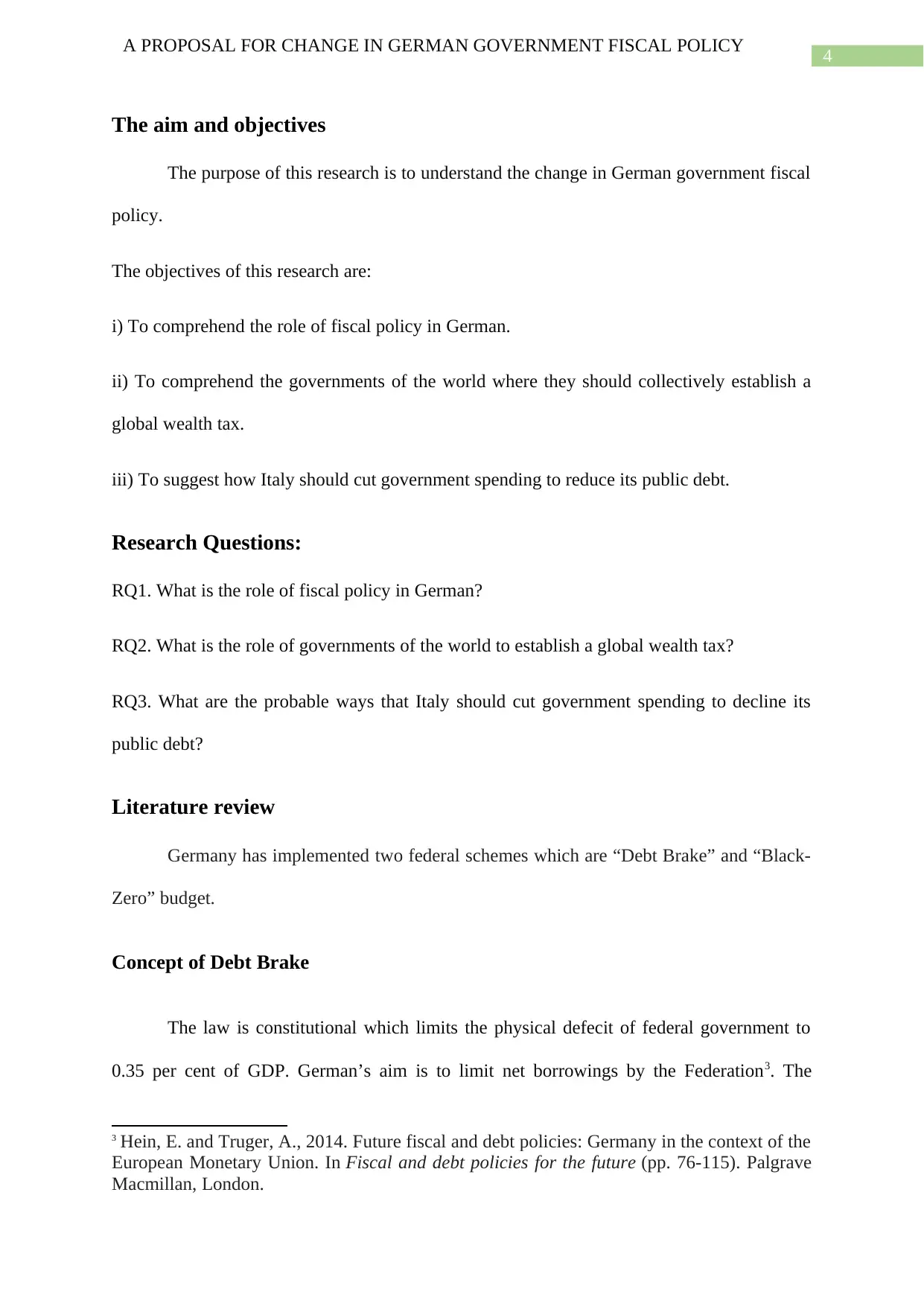
4
A PROPOSAL FOR CHANGE IN GERMAN GOVERNMENT FISCAL POLICY
The aim and objectives
The purpose of this research is to understand the change in German government fiscal
policy.
The objectives of this research are:
i) To comprehend the role of fiscal policy in German.
ii) To comprehend the governments of the world where they should collectively establish a
global wealth tax.
iii) To suggest how Italy should cut government spending to reduce its public debt.
Research Questions:
RQ1. What is the role of fiscal policy in German?
RQ2. What is the role of governments of the world to establish a global wealth tax?
RQ3. What are the probable ways that Italy should cut government spending to decline its
public debt?
Literature review
Germany has implemented two federal schemes which are “Debt Brake” and “Black-
Zero” budget.
Concept of Debt Brake
The law is constitutional which limits the physical defecit of federal government to
0.35 per cent of GDP. German’s aim is to limit net borrowings by the Federation3. The
3 Hein, E. and Truger, A., 2014. Future fiscal and debt policies: Germany in the context of the
European Monetary Union. In Fiscal and debt policies for the future (pp. 76-115). Palgrave
Macmillan, London.
A PROPOSAL FOR CHANGE IN GERMAN GOVERNMENT FISCAL POLICY
The aim and objectives
The purpose of this research is to understand the change in German government fiscal
policy.
The objectives of this research are:
i) To comprehend the role of fiscal policy in German.
ii) To comprehend the governments of the world where they should collectively establish a
global wealth tax.
iii) To suggest how Italy should cut government spending to reduce its public debt.
Research Questions:
RQ1. What is the role of fiscal policy in German?
RQ2. What is the role of governments of the world to establish a global wealth tax?
RQ3. What are the probable ways that Italy should cut government spending to decline its
public debt?
Literature review
Germany has implemented two federal schemes which are “Debt Brake” and “Black-
Zero” budget.
Concept of Debt Brake
The law is constitutional which limits the physical defecit of federal government to
0.35 per cent of GDP. German’s aim is to limit net borrowings by the Federation3. The
3 Hein, E. and Truger, A., 2014. Future fiscal and debt policies: Germany in the context of the
European Monetary Union. In Fiscal and debt policies for the future (pp. 76-115). Palgrave
Macmillan, London.
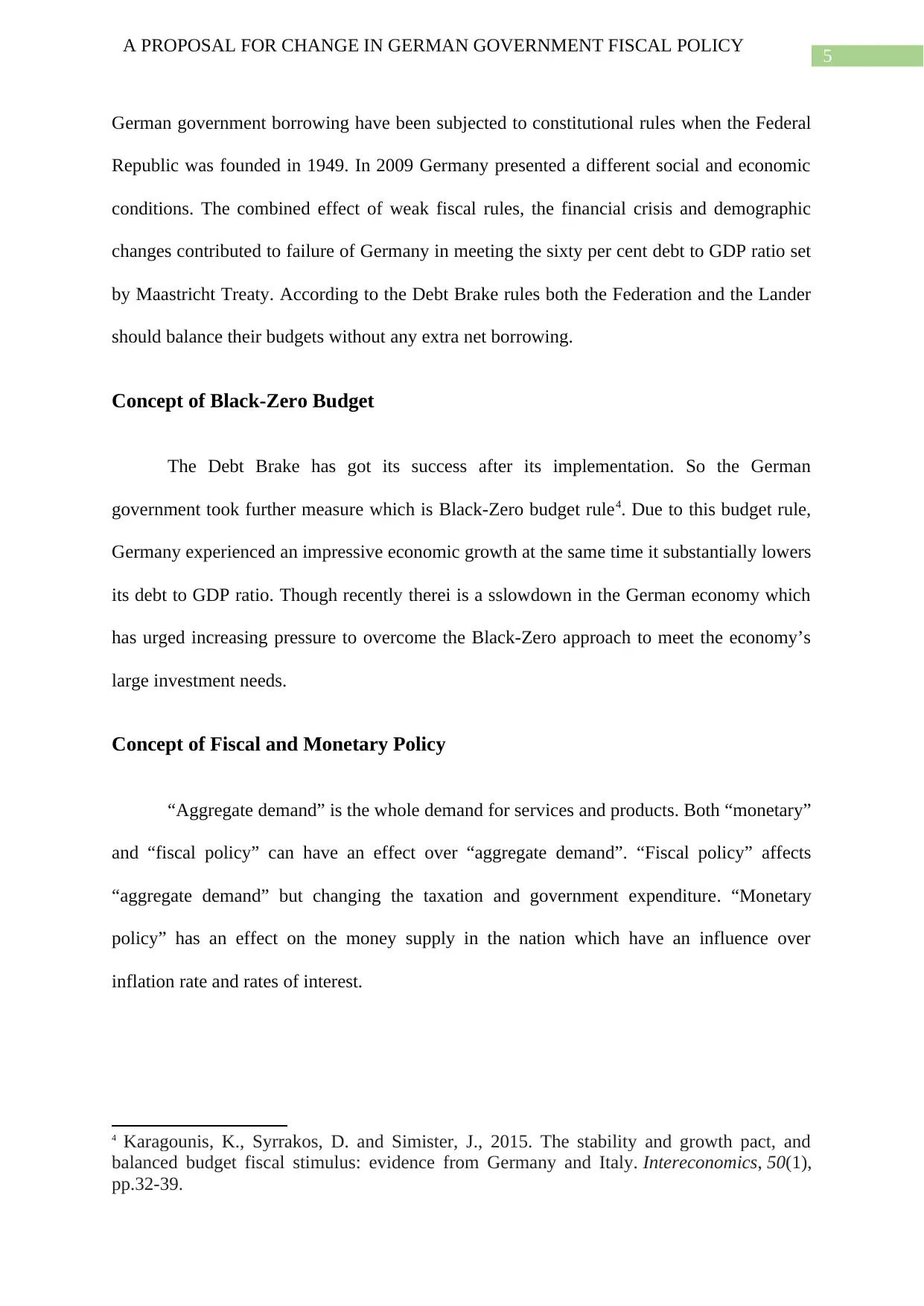
5
A PROPOSAL FOR CHANGE IN GERMAN GOVERNMENT FISCAL POLICY
German government borrowing have been subjected to constitutional rules when the Federal
Republic was founded in 1949. In 2009 Germany presented a different social and economic
conditions. The combined effect of weak fiscal rules, the financial crisis and demographic
changes contributed to failure of Germany in meeting the sixty per cent debt to GDP ratio set
by Maastricht Treaty. According to the Debt Brake rules both the Federation and the Lander
should balance their budgets without any extra net borrowing.
Concept of Black-Zero Budget
The Debt Brake has got its success after its implementation. So the German
government took further measure which is Black-Zero budget rule4. Due to this budget rule,
Germany experienced an impressive economic growth at the same time it substantially lowers
its debt to GDP ratio. Though recently therei is a sslowdown in the German economy which
has urged increasing pressure to overcome the Black-Zero approach to meet the economy’s
large investment needs.
Concept of Fiscal and Monetary Policy
“Aggregate demand” is the whole demand for services and products. Both “monetary”
and “fiscal policy” can have an effect over “aggregate demand”. “Fiscal policy” affects
“aggregate demand” but changing the taxation and government expenditure. “Monetary
policy” has an effect on the money supply in the nation which have an influence over
inflation rate and rates of interest.
4 Karagounis, K., Syrrakos, D. and Simister, J., 2015. The stability and growth pact, and
balanced budget fiscal stimulus: evidence from Germany and Italy. Intereconomics, 50(1),
pp.32-39.
A PROPOSAL FOR CHANGE IN GERMAN GOVERNMENT FISCAL POLICY
German government borrowing have been subjected to constitutional rules when the Federal
Republic was founded in 1949. In 2009 Germany presented a different social and economic
conditions. The combined effect of weak fiscal rules, the financial crisis and demographic
changes contributed to failure of Germany in meeting the sixty per cent debt to GDP ratio set
by Maastricht Treaty. According to the Debt Brake rules both the Federation and the Lander
should balance their budgets without any extra net borrowing.
Concept of Black-Zero Budget
The Debt Brake has got its success after its implementation. So the German
government took further measure which is Black-Zero budget rule4. Due to this budget rule,
Germany experienced an impressive economic growth at the same time it substantially lowers
its debt to GDP ratio. Though recently therei is a sslowdown in the German economy which
has urged increasing pressure to overcome the Black-Zero approach to meet the economy’s
large investment needs.
Concept of Fiscal and Monetary Policy
“Aggregate demand” is the whole demand for services and products. Both “monetary”
and “fiscal policy” can have an effect over “aggregate demand”. “Fiscal policy” affects
“aggregate demand” but changing the taxation and government expenditure. “Monetary
policy” has an effect on the money supply in the nation which have an influence over
inflation rate and rates of interest.
4 Karagounis, K., Syrrakos, D. and Simister, J., 2015. The stability and growth pact, and
balanced budget fiscal stimulus: evidence from Germany and Italy. Intereconomics, 50(1),
pp.32-39.
⊘ This is a preview!⊘
Do you want full access?
Subscribe today to unlock all pages.

Trusted by 1+ million students worldwide
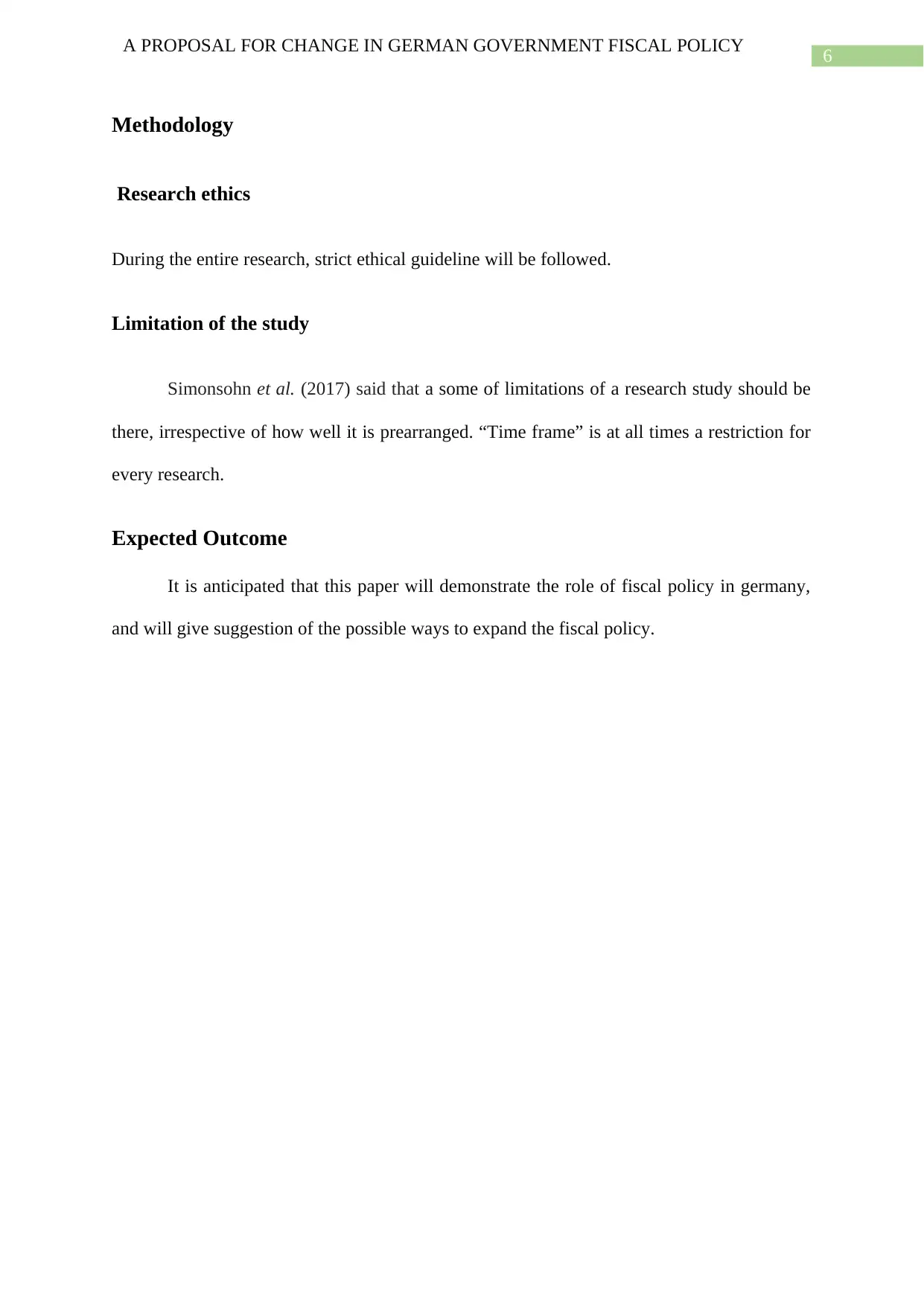
6
A PROPOSAL FOR CHANGE IN GERMAN GOVERNMENT FISCAL POLICY
Methodology
Research ethics
During the entire research, strict ethical guideline will be followed.
Limitation of the study
Simonsohn et al. (2017) said that a some of limitations of a research study should be
there, irrespective of how well it is prearranged. “Time frame” is at all times a restriction for
every research.
Expected Outcome
It is anticipated that this paper will demonstrate the role of fiscal policy in germany,
and will give suggestion of the possible ways to expand the fiscal policy.
A PROPOSAL FOR CHANGE IN GERMAN GOVERNMENT FISCAL POLICY
Methodology
Research ethics
During the entire research, strict ethical guideline will be followed.
Limitation of the study
Simonsohn et al. (2017) said that a some of limitations of a research study should be
there, irrespective of how well it is prearranged. “Time frame” is at all times a restriction for
every research.
Expected Outcome
It is anticipated that this paper will demonstrate the role of fiscal policy in germany,
and will give suggestion of the possible ways to expand the fiscal policy.
Paraphrase This Document
Need a fresh take? Get an instant paraphrase of this document with our AI Paraphraser
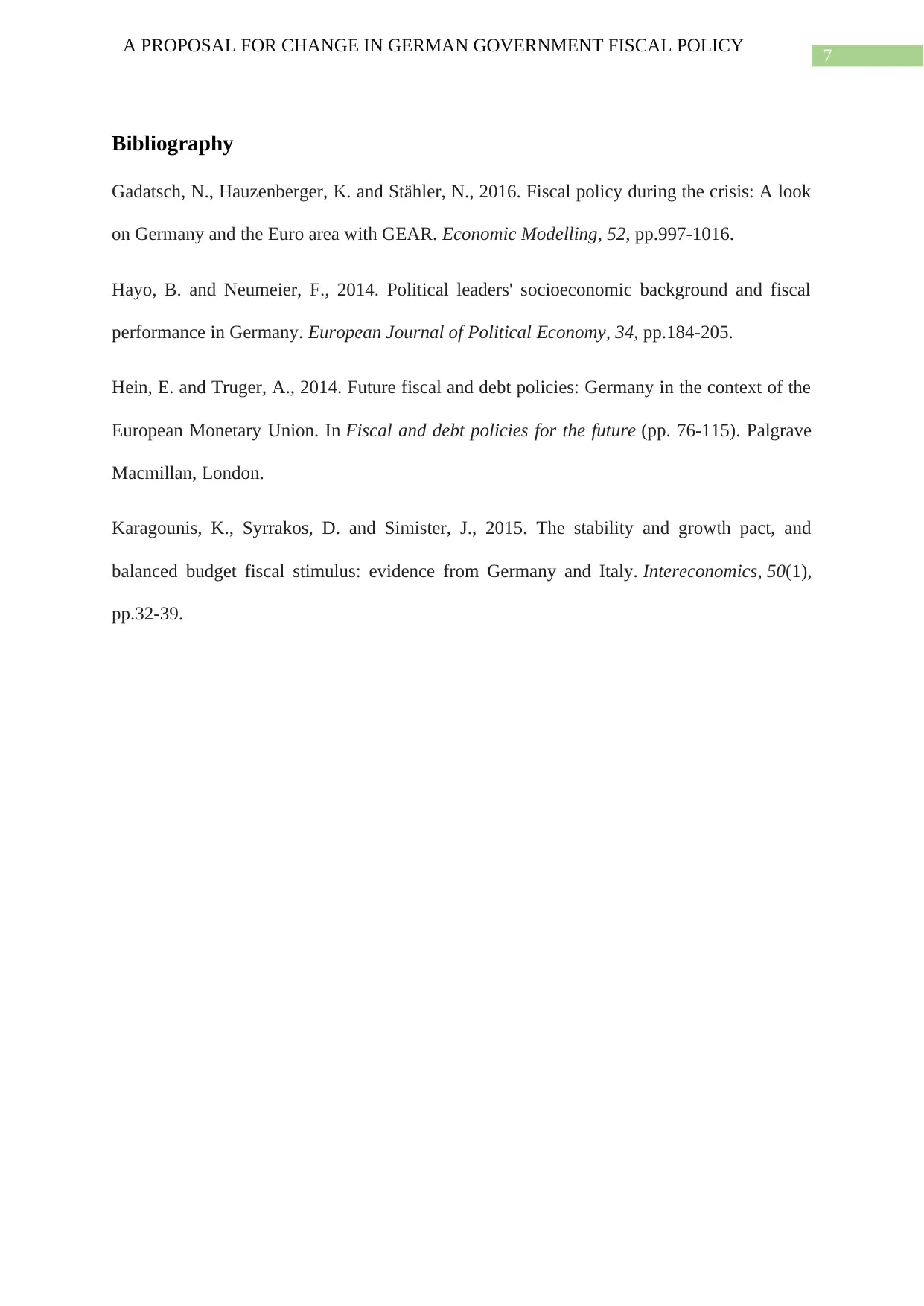
7
A PROPOSAL FOR CHANGE IN GERMAN GOVERNMENT FISCAL POLICY
Bibliography
Gadatsch, N., Hauzenberger, K. and Stähler, N., 2016. Fiscal policy during the crisis: A look
on Germany and the Euro area with GEAR. Economic Modelling, 52, pp.997-1016.
Hayo, B. and Neumeier, F., 2014. Political leaders' socioeconomic background and fiscal
performance in Germany. European Journal of Political Economy, 34, pp.184-205.
Hein, E. and Truger, A., 2014. Future fiscal and debt policies: Germany in the context of the
European Monetary Union. In Fiscal and debt policies for the future (pp. 76-115). Palgrave
Macmillan, London.
Karagounis, K., Syrrakos, D. and Simister, J., 2015. The stability and growth pact, and
balanced budget fiscal stimulus: evidence from Germany and Italy. Intereconomics, 50(1),
pp.32-39.
A PROPOSAL FOR CHANGE IN GERMAN GOVERNMENT FISCAL POLICY
Bibliography
Gadatsch, N., Hauzenberger, K. and Stähler, N., 2016. Fiscal policy during the crisis: A look
on Germany and the Euro area with GEAR. Economic Modelling, 52, pp.997-1016.
Hayo, B. and Neumeier, F., 2014. Political leaders' socioeconomic background and fiscal
performance in Germany. European Journal of Political Economy, 34, pp.184-205.
Hein, E. and Truger, A., 2014. Future fiscal and debt policies: Germany in the context of the
European Monetary Union. In Fiscal and debt policies for the future (pp. 76-115). Palgrave
Macmillan, London.
Karagounis, K., Syrrakos, D. and Simister, J., 2015. The stability and growth pact, and
balanced budget fiscal stimulus: evidence from Germany and Italy. Intereconomics, 50(1),
pp.32-39.
1 out of 8
Related Documents
Your All-in-One AI-Powered Toolkit for Academic Success.
+13062052269
info@desklib.com
Available 24*7 on WhatsApp / Email
![[object Object]](/_next/static/media/star-bottom.7253800d.svg)
Unlock your academic potential
Copyright © 2020–2026 A2Z Services. All Rights Reserved. Developed and managed by ZUCOL.





